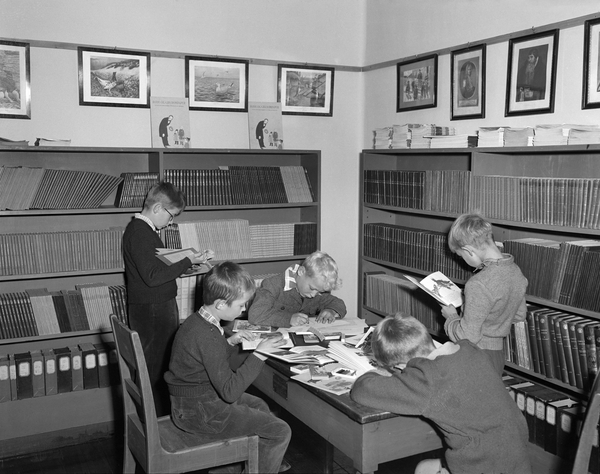
I have sifted through the entire library upstairs at school and culled quite a few books from the collection. This made me very philosophical about the state of school libraries in general.
When I was a kid, books were restricted resources while time to read them was almost unlimited. I could either read books, or run around with a mullet on my head and a rusty pocket knife in my pocket. In rain or snow. Alone.
For most kids today, the relationship is inverse. They have plenty of access to colourful books of excellent print quality but not a whole lot of time to read them. The amount of books available is simply so large, it’s impossible for a child to feel much excitement about books as objects. This is no fault of their own, of course. They observe that books are insanely plentiful and they have judged, correctly in my view, that most of them are not very good.
Our school library at EFD had, for example, an enormous amount of books based on Disney movies. These books might have made sense when they were issued, when the films themselves were extremely hard to come by. (Where I grew up, they were screened in cinemas on a seven year rotation schedule. If you missed La Belle et le Clochard, tough luck. You had to wait seven years to get another chance.) Today these books, hastily thrown together in some Franco-era Spanish sweatshop (Spain had commercial art as an export industry), just don’t make much sense. On top of that, they’re boring, trite and ugly, even when the movies themselves were excellent.
I never saw any child at school look at these books with even the slightest flicker of interest.
Too many children’s books, I’m sorry to say, have been made with no love whatsoever. It’s very easy to see which books might spark a passion for reading in a child, and which will make a child think: “This is bullshit, I’m off to see if Lucia has any rugbrød I can eat instead.”
I’m not absolutely positive about this, but it seems as if the school library has become the depository of books parents didn’t want at home. Maybe the family received these books as gifts from clueless, childless uncles, bought in a mindless, frothing panic before visiting. There were very, very few classics in the selection. Some abridged versions of Mark Twain and Jack London, one and a half book by Astrid Lindgren.
I kept all the books in the “Martine”-series, they are priceless windows into a previous age. But there was no Dumas! No Jules Verne! And I totally understand. I don’t want to give away my kids’ nicest books either.
There are still quite a lot of books left in the library. Much more than any kid will ever read while attending school. Quite a few collections of fairy tales, a whole bunch of novels, some very nice picture books and reference books. In my view, the only things that has been lost by reducing the number of books are obstacles to finding a volume actually worth reading.
A few of our kids faithfully bring their own books to read at school. Teachers have previously tried to encourage more to do the same, but with little long-term success. I think there are several reasons for this, one of them being that reading is a much more social activity for children than adults often realize. For many kids, bringing a book from home that nobody’s heard about just feels weird.
I have some plans for what to do about reading, to be revealed with the rest of the school program in August. Until then, permit me to post a reminder that research indicates reading aloud to kids gives them crazy advantages on almost every level. School is all very nice and good, but the real magic happens at home.